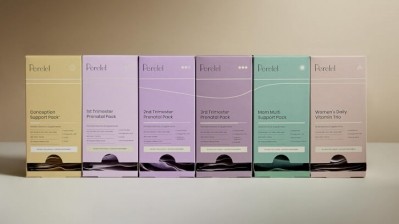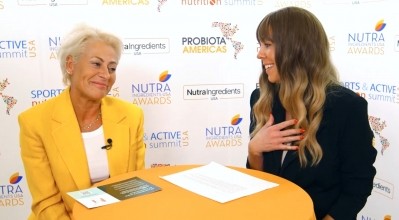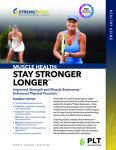Market moving to modulate the menopausal microbiome

According to Lumina Intelligence, which tracks close to 5,000 probiotics across the ecommerce retail channel in 25 countries, companies are starting to exploit the growing understanding of the connection between the female endocrine system and the microbiome. The insights service has already registered a significant spike in menopause supplement launches formulated with probiotics since releasing its 2022 report on the white space for probiotics in the menopause transition.
“In 2017, there were just nine products across markets,” said Ewa Hudson, director of insights at Lumina Intelligence. “That jumped to 19 products roughly in 2021 and to 49 products that we are tracking as of June 2023, so you can see an accelerated pace of growth of product development for biotic menopausal formulations.”
The gut-hormone connection
Most menopause supplements on the market today employ botanicals like black cohosh, chasteberry or soy isoflavones as palliative alternatives to hormonal replacement therapy and antidepressants. Growing associations between female sex hormones and gut microbiome composition, however, are making the case for probiotics as complementary natural ingredient.
In July, microbiome health company Nouri Life launched its Menopause Health Probiotic supplement, the first to incorporate Floradapt Menopause, a blend of proprietary probiotic strains developed by probiotic specialists Kaneka Probiotics and AB-Biotics. The Nouri formula also includes botanical antioxidant resveratrol to boost cerebrovascular and cognitive functions.
“A lot of hormone production actually takes place in the gut,” said Caroline Carralero, founder and CEO at Nouri. “Even though estrogen production declines in the reproductive system during menopause, you can actually modulate the gut to help your body metabolize circulating estrogen and use the power of the microbiome and the gut-brain connection to address menopause with a completely new approach—supporting your body’s own natural estrogen production.”
Jordi Riera, chief business manager at Kaneka Probiotics, said that understanding the mechanism of action is crucial to comprehend how these specific strains (L. brevis KABP-052, L. plantarum KABP-051 and P. acidilactici KABP-021) support women in their menopause transition.
“During menopause, in addition to the reduced estrogen production, the gastrointestinal tract also concurrently excretes estrogen,” he explained. “Preclinical research has shown that certain gut bacteria, characterized by glucuronidase activity (GUS+), secrete an enzyme known as beta-glucuronidase. This enzyme can help deconjugate estrogens, which may ultimately support an increase in the level of circulating estrogens, namely estrone and estradiol.”
The blend’s deconjugation potential is substantiated by a double-blind, randomized, placebo-controlled study (slated for publication in 2024), which Riera said emerged from probiotic and menopause research initiated years before the exponential increase in gut-hormone axis attention.
Kaneka also supplies the Lactobacillus plantarum DR7 strain that is combined with grape seed and Siberian rhubarb extracts in Hum Nutrition’s Fan Club menopause supplement that launched in 2021. Dr. Jennifer Martin-Biggers, vice president of scientific affairs at Hum, said that probiotic strains like L. plantarum DR7 have been clinically shown to influence signals in the gut that can impact the brain’s regulation of stress hormones like cortisol.
“Our gut microbiota are actively communicating with the endocrine system, which can impact secretion of hormones like insulin, ghrelin and leptin which regulate metabolism,” she added.
Hum sponsored its own clinical trial in 101 perimenopausal and menopausal women aged 38 to 60 years to evaluate the efficacy of the Fan Club formula, reporting that daily supplementation decreased the severity of menopause symptoms ranging from depressive mood and vaginal dryness to heart racing and joint discomfort as early as four weeks.
“A dietary supplement containing clinically studied botanical extracts and a probiotic provided beneficial improvements for common symptoms of menopause, including vasomotor, sleep, and mood problems, indicating an effective alternative treatment for peri- and menopausal discomforts,” the study concluded.
Still early days, market is there
This combination of emerging science, demand for natural alternatives and steady flow of consumers inevitably embarking on the menopause journey is fueling a global menopause market that Grand View Research valued at $16.9 billion in 2022. Of this, the supplements segment accounted for over 95% of revenue share.
Lumina Intelligence first noticed the emergence of menopause supplements formulated with probiotics in the Asia-Pacific and European regions but recently assessed an increase in U.S. brands entering the category. For example, Pre + Pro Optimize by New Age has sold over 1,000 units in the last month and garnered over 600 reviews on Amazon since May. It is formulated with the same thermogenic probiotic strains (L. Gasseri, B.Breve and B.Lactis) found in Provitalize by Better Body Co., which continues to lead with close to 30,000 Amazon ratings since 2021.
Kaneka has also observed the “significant surge” in online engagement (highlighting a 440% spike in reviews in Canada) and attributes the rise in popularity to not only the science but to advancements in menopause awareness. Recent initiatives like the Gen M movement, Bonafide’s annual State of Menopause report and other brand-led efforts are making considerable strides in demystifying a previously taboo category.
In the last few years, the heightened awareness has also led to the foundation of the Menopause Society of Canada (which recently reported on the productivity lost to menopause), the creation of City Hall London’s menopause workplace policy and inclusion on the new White House initiative on women’s health research agenda, announced earlier this week.
Hudson of Lumina Intelligence noted that “the numbers of women and the demand for natural solutions are there to support any business plan” but said that probiotic menopause supplements will require more time in the marketplace to prove their efficacy.
"The consumers need to feel that they actually work because right now there might be 50 products out there, and the number of products is rising, but it's still a very early stage of the product development life cycle," she said. "We just need to hope at this point that the science will deliver, that the product will deliver."
















